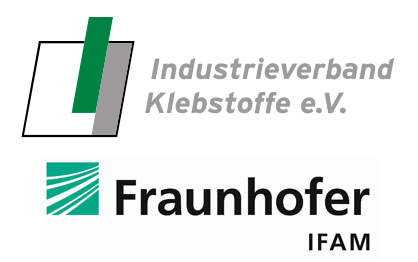4.2 Factors influencing adhesive selection

Substrates
Points to consider:
- Substrate material
- Mechanical properties such as strength, rigidity, etc.
- Properties of the surface, e.g. contamination, surface tension
- Surface treatment of the substrates
- Thermal stability
- Resistance to physical and chemical loads
- Size and geometry of the bonding area
- …
Health and safety at work and environmental protection
Points to consider:
- Potential hazard represented by the adhesive and auxiliary materials
- Possible alternative adhesives representing a lower hazard
- Protective measures
- Storage and transport
- Minimisation of waste, waste disposal
- Statutory regulations
- …
Process management:
Points to consider:
- Process integration, cycle time, number of pieces
- Surface treatment
- Required viskosity and flow properties of the adhesive
- Application method (bead, film, spots)
- Process parameters: time, temperature, pressure, etc.
- Securing/positioning, hybrid joining
- Curing, hand strength
- Component tolerances (allowable margins)
- …
Quality assurance:
Points to consider:
- Monitoring of received goods
- Storage conditions
- In-line monitoring, test methods
- QA measures for production steps
- In-service monitoring
- …
Stress/loads:
- Mechanical loads (static: shear, peel, compressive and tensile loads; dynamic: vibrations and impact loads) during the production and during normal usage
- Thermal loads (temperature, duration and rapid temperature changes)
- Exposure to media such as cleaning agents, solvents and other chemicals (e.g. coolants)
- Effect of moisture
- Radiation (e.g. UV radiation)
Long-term stability:
- Definition of the desired service life of the product
- Specification and execution of suitable ageing tests which optimally simulate real ageing processes
The predetermined requirements of the adhesive, which can be vary varied, are then compared with the properties of different adhesives in order to get an optimum match.
The following pages outline the typical properties and processing characteristics of different adhesives. Special products cannot, however, be covered here. Relevant information can if needed be obtained from the manufacturers and independent advisers.
The following points hold for all adhesives:
- The properties are product-specific. Acquire information from data sheets and/or contact the manufacturer.
- Prior to processing an adhesive read the technical data sheet
- Check the shelf-life
- Ensure adhesives are stored correctly
- Acclimatise adhesives, auxiliary materials and substrates
- Heed the lower and upper temperature limits for processing the adhesive; In general, bonding is not possible below 5°C!
- Adhesive bonding requires cleanliness
- Only remove the positioning device after reaching hand strength



